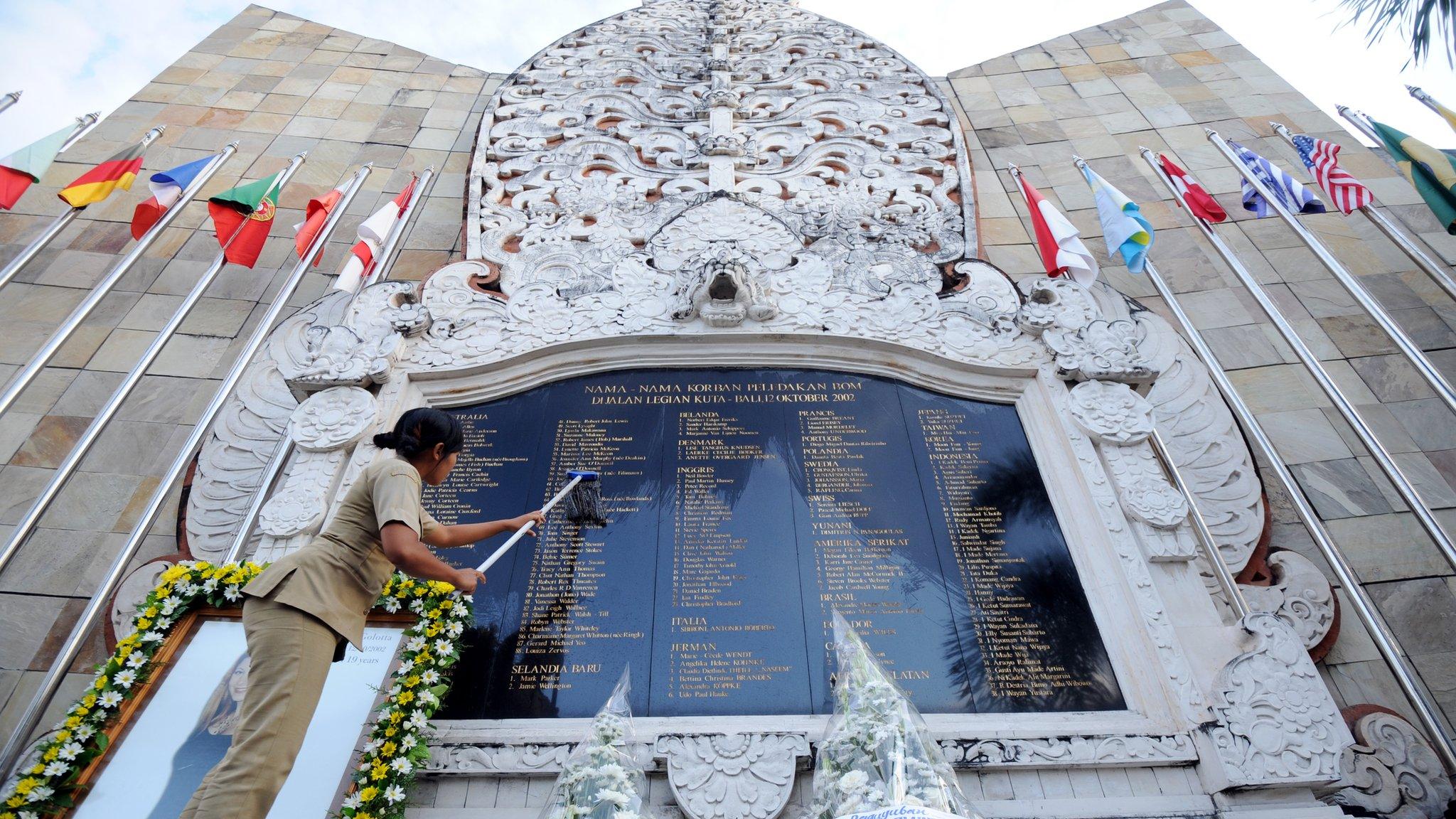Crossing Divides: The bomb maker turned peacemaker
- Published
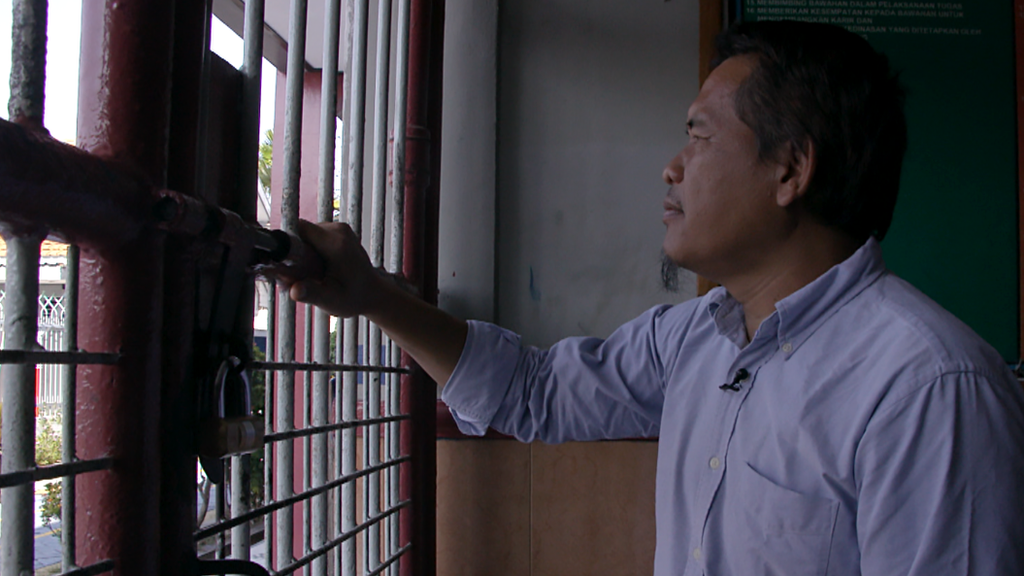
Ali Fauzi is now helping others turn their backs on extremism and intolerance
"I am an expert bomb maker. I can make bombs in just five minutes."
Ali Fauzi was a key member of Jemaah Islamiyah, a militant group with links to al-Qaeda, which was responsible for Indonesia's worst attack - the 2002 Bali bombing that killed more than 200 people.
"My brothers carried out the Bali bombing. It was huge bomb in the heart of the island's tourist district."
The group went on to carry out a string of bombings in Indonesia. They were deadly attacks on major hotels and Western embassies. The seemingly sleepy village of Tenggulun in Lamongan, East Java was the group's base camp.
Now Ali Fauzi's mission is very different. He works to help former jihadis leave a life of violence and to stop new recruits from joining the next wave of militant groups in South East Asia.
"The reality is that it is much easier to recruit people to terrorist groups," he says.
"They only have to pull a trigger and lots of people will join them but the process of deradicalisation takes time. It has to be done step by step."
And his new mission has come at a high personal cost.
"The threats against me are intense, it's not just verbal attacks but death threats. But, honestly, I am not scared because I know what I am doing is right. I am ready and prepared to die doing this."

It was videos of foreign wars - in Afghanistan, Bosnia and the Palestinian Territories, watched on mobile phones from their quiet Javanese village - that motivated Ali Fauzi and his brothers to join militant groups.
"We saw videos of the brutal attacks on civilians. I wanted to carry out jihad to protect the Muslim people from the bullies. With young, hot blood I wanted to fight back."
While his brothers went to fight alongside the mujahideen, in Afghanistan, Ali Fauzi stayed closer to home, joining Islamic militants fighting for a Muslim homeland in the southern Philippines.
"I really wanted to die there. I imagined my own death all the time," he says.
"I believed that if I was killed in battle I would go straight to heaven and be met by angels there. That's what our mentors told us every day."
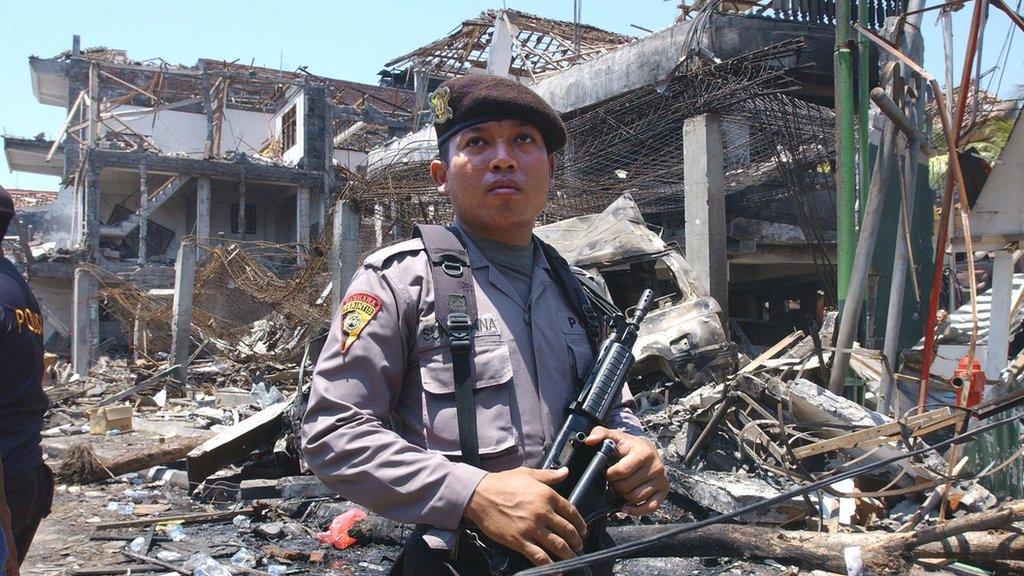
The 2002 bombings killed 202 people
When his brothers returned from Afghanistan, they put into practice what they had learnt abroad.
In October 2002, they were among a group that detonated two bombs targeting nightclubs in the Kuta area of Bali, the island popular with international tourists.
"I saw it on TV and I was shocked, there were so many dead bodies," says Ali Fauzi. "It led the authorities right to us."
Two of his brothers, Ali Ghufron and Amrozi, were executed while his third, Ali Imron, is behind bars for life.
Ali Fauzi, who insists he was not involved in the Bali bombing, spent three years in jail for other terror-related offences. That's when his life took on a dramatically new direction.
"Police treated me very humanely. If they had tortured me then maybe seven generations after me would be fighting the Indonesian government," he says.
"I hated the police, we thought of them as Satan. That's what we were taught. But the reality was completely different. That's when my whole perspective completely changed."
He also met victims of bombings his group had carried out.
"I cried. My heart melted, seeing the horrific effect our bombs had. That's what made me really want to change from an agent of war to become a warrior for peace."

See what happened when a man who lost his father in the Bali bombing met perpetrator Ali Imron

As the evening call to prayer rings out across the Tenggulun village, prayer mats are rolled out in a square at the side of the village's main mosque. They are just next to the office of Circle of Peace, the foundation Ali Fauzi set up in 2016 to divert people away from extremism.
The prayer event tonight is led by two bomb victims, guests of honour in this village which was once the base camp for the militant groups that carried out the attacks that destroyed their lives.
"I often bring victims to the community," Ali Fauzi says, "as meeting them was the thing that destroyed my ego."
On the screen on the side of the stage a graphic video shows the aftermath of all the bombs in Indonesia.
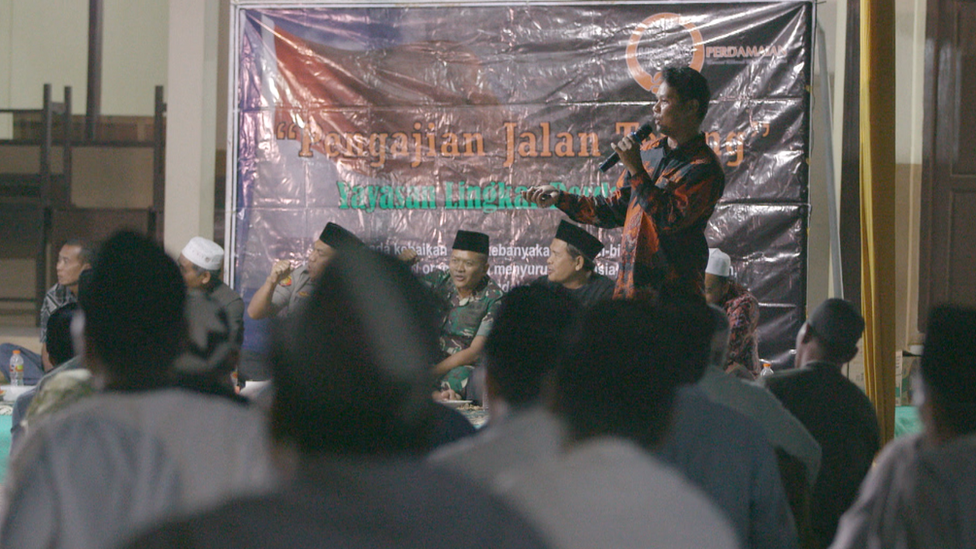
It's an extraordinary meeting. In the audience are police who arrested members of this community, as well as those who have served time in jail on terrorism offences.
They are listening to the victims of the bombing talk, through tears, about the pain they have suffered.
In the audience is 33-year-old Zulia Mahendra. He was a teenager when his father, Amrozi, was arrested, sentenced to death and then later executed for the Bali bombing.
Amrozi was dubbed the "smiling assassin" by the media because he showed no remorse during the trial, grinning throughout and defiant to his death.

Crossing divides
A season of stories about bringing people together in a fragmented world.

After the meeting, Mahendra greets the two bomb victims. They hug and hold hands, and he repeatedly says sorry.
"I want to say sorry, not because I am wrong. But he was my father and these are the victims of my family's actions. I have a responsibility to say sorry, on behalf of my father."
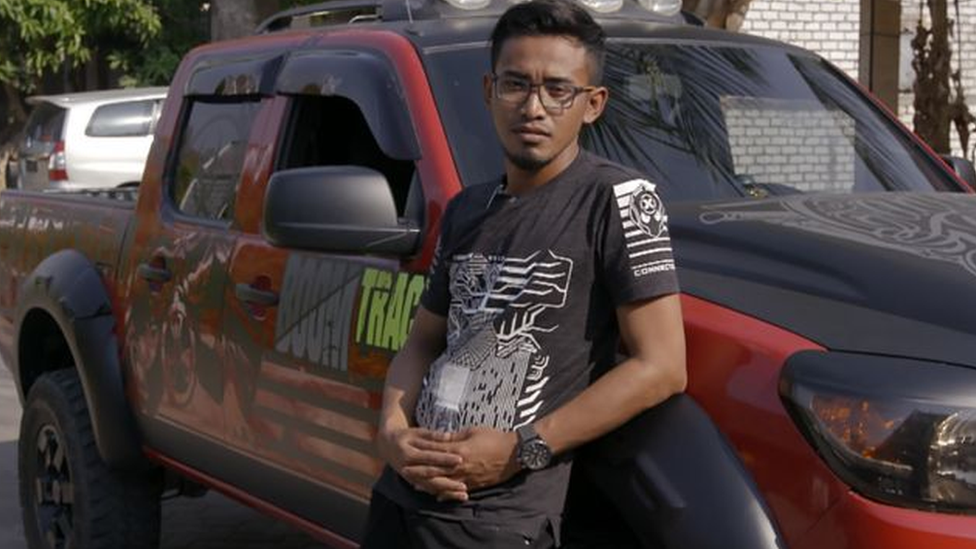
Zulia Mahendra was 16 when his father was arrested and then later executed for the Bali bombing
Mahendra, too, has gone through an astonishing transformation.
"When my father was executed, I wanted revenge. I wanted to learn how to make bombs too," he admits.
"But over time and with guidance from my uncles - Ali Fauzi and Ali Imron - they made me realise it was the wrong thing to do. And I joined their project to help other terrorists change."
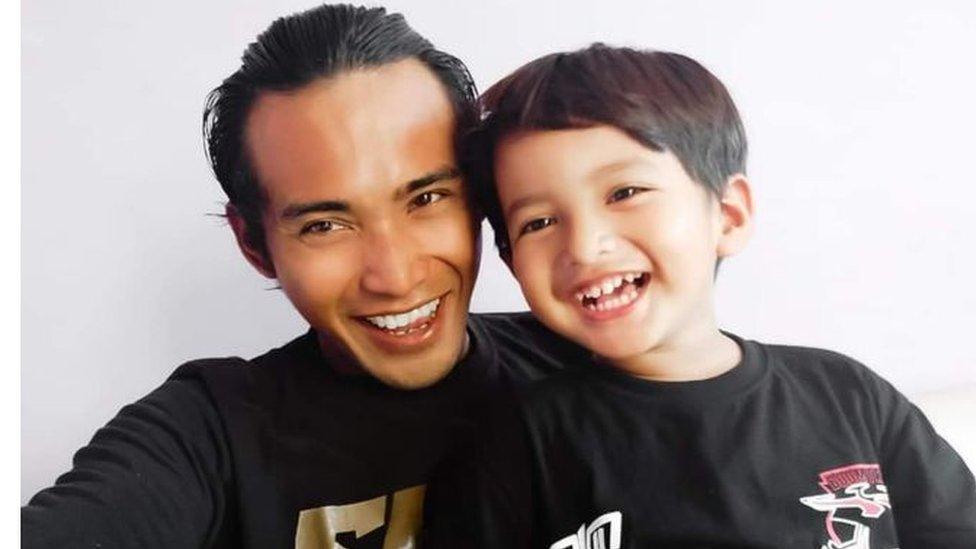
Zulia Mahendra with his son
"How I became who I am today was a very, very long journey," says Mahendra.
"But I came to a place where I understood that jihad is not killing people or fighting, it can mean working hard for your family."
One night, Mahendra says, he looked tearfully at his sleeping child and thought about his father.
"I didn't want my child to have to go through what I have. If I continued on my father's path, my child too would be abandoned. I knew that the right jihad was to look after them - to protect them."
But he says he has friends who have joined splinter militant groups in Indonesia, loosely linked to the Islamic State (IS) group.
"There are lots of reasons why a person goes in that direction - their economic situation, not having anything to do... what they are taught and who they are influenced by."

Ali Fauzi knocks at the door of the Lamongan jail. This is a familiar place for him, having come here many times to meet family members serving time but also to work with new inmates to try and turn their life around.
"My deradicalisation work is not based on theory. It's from life experience. I was a fighter and a terrorist, so I come into the cells as a friend."
But he faces resistance and is viewed by some as a traitor for working with the police.
"They say that I am even more of a kafir [unbeliever] than the police or jail guards. I regularly face online abuse and threatening phone calls. But it's okay. I can handle it," he says with a smile.
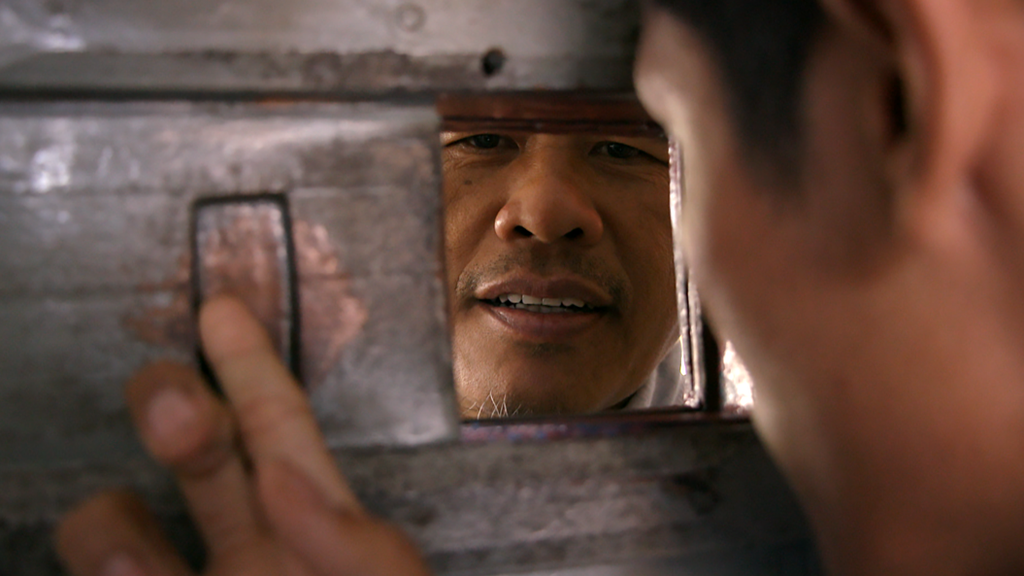
"Out of the 98 people we have worked with since 2016, two have come out of jail and gone straight back to their militant ways."
"Deradicalisation is not easy because you are dealing with people's emotions and way of thinking, you have to give them the right medicine. And sometimes we get it wrong."
Sometimes they get it right.
Sumarno, he says, is one of his success stories.
He takes me to a dry field, at the side of the road outside the village. It was here that Sumarno says he hid weapons belonging to Jemaah Islamiyah, after the Bali bombing.
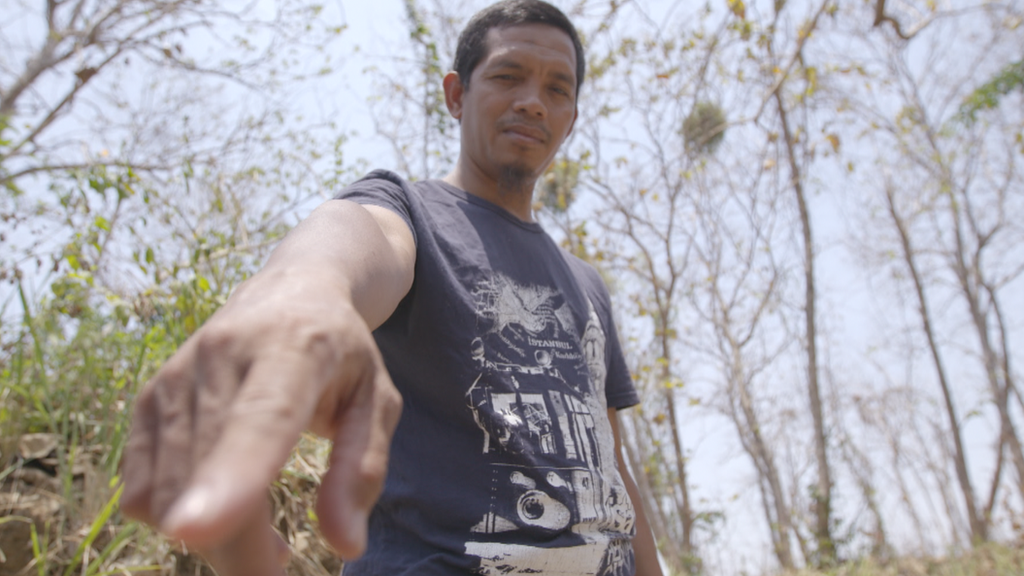
Sumarno points to where he hide weapons after the 2002 Bali bombings.
After serving a three-year jail sentence, Ali Fauzi helped Sumarno set up a small business - a travel company offering pilgrimage packages to Mecca.
"Now I want to give back to society," says Sumarno. "With this travel company, I hope that I can leave a life of violence behind me."
Sitting in his smart air-conditioned office in Paciran, a 20-minute drive from the village, he says he was nervous at first about telling his clients about his violent past, even careful not to say which village he was from.
But now he starts the tour with what he calls his story of redemption.
"I say I am the cousin of Ali Gufron and Amrozi who were executed for carrying out the Bali bombings. I tell them: 'I was part of their group. But thanks be to Allah I have been healed from that rotten way of thinking. And I am your tour guide to Mecca.'"

In a room at the side of the village mosque, an after-school club takes place. Children dressed in colourful clothes recite the Koran.
Some of their parents are behind bars on terrorism charges.
The teachers include Ali Fauzi's wife, Lulu, and Zumrottin Nisa, who is married to Ali Imron.
"We stress to them that not everyone believes the same thing," says Lulu.
"That there are people in our community who are non-Muslim and we have to treat them with respect as long as they don't try to interfere with our faith."
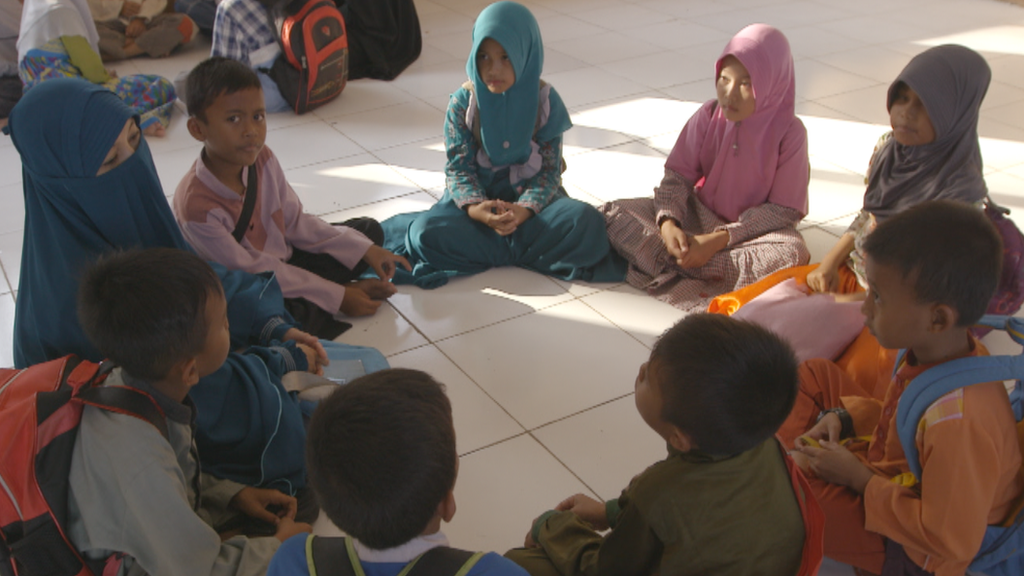
But she says they haven't convinced everyone.
"There are those for and against our new mission. Those that are still militant don't like us now. They stay away from us," she says.
"We used to be one group with the same mission but we changed after the Bali bombing killed so many innocent people, many of them Muslims. There are others who haven't changed."

In May last year, a family of suicide bombers attacked three churches in East Java.
The father went after one, his teenage sons went after another, and his wife and two daughters, age 12 and nine, blew themselves up at the third.
The attackers were part of the Jamaah Ansharut Daulah (JAD) network, which is loosely linked to IS.
JAD has carried out a series of lone wolf attacks against Indonesian security forces and religious minorities. The most recent was a knife attack, by a young couple, against the country's top security officer, Wiranto.
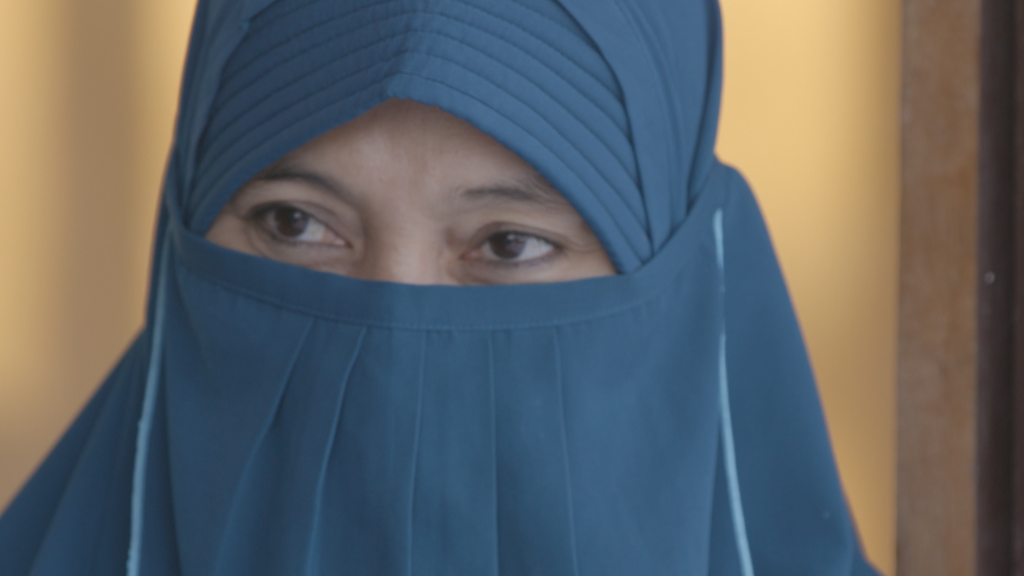
Lulu Fauzi
In the Circle of Peace office, Lulu Fauzi says she is shocked women are taking such an active part.
"My husband is working hard to make sure former terrorism inmates don't go back. He is bringing them together and he has been able to turn around many people.
"But many people are still radical. We can never really wipe it out," she says.

As we drive through the village, Ali Fauzi's phone is constantly ringing.
He takes a call from someone who has recently been released, having served time on terrorism charges. The person needs help getting housing.
Another call is from a mother whose son is being questioned by the police.
"Dozens of people from our community went to fight with the Islamic State in Syria and Iraq," he says. "Not long ago, a member of IS was detained by the police here. So militant groups still exist and they still threaten Indonesia."
Now he's on the side of what he describes as a battle against extremism and intolerance.
"If we work hard and involve the whole community, then I am still hopeful that we can win this war."
- Published17 February 2020
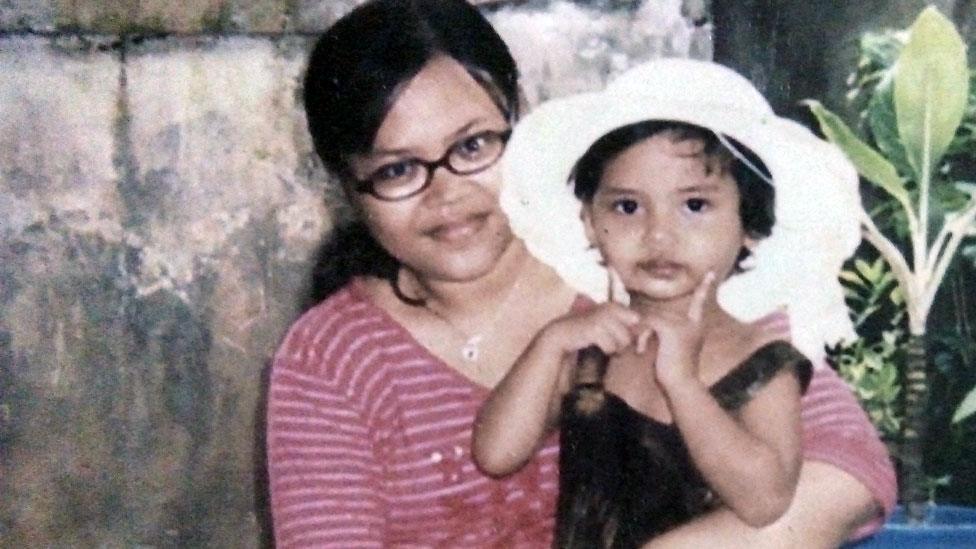
- Published17 February 2020
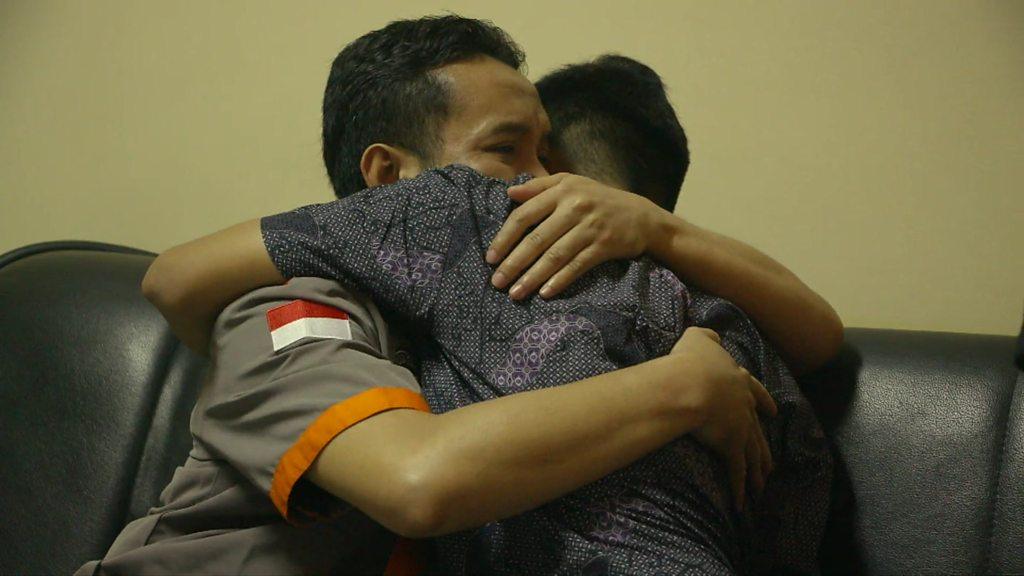
- Published20 July 2016
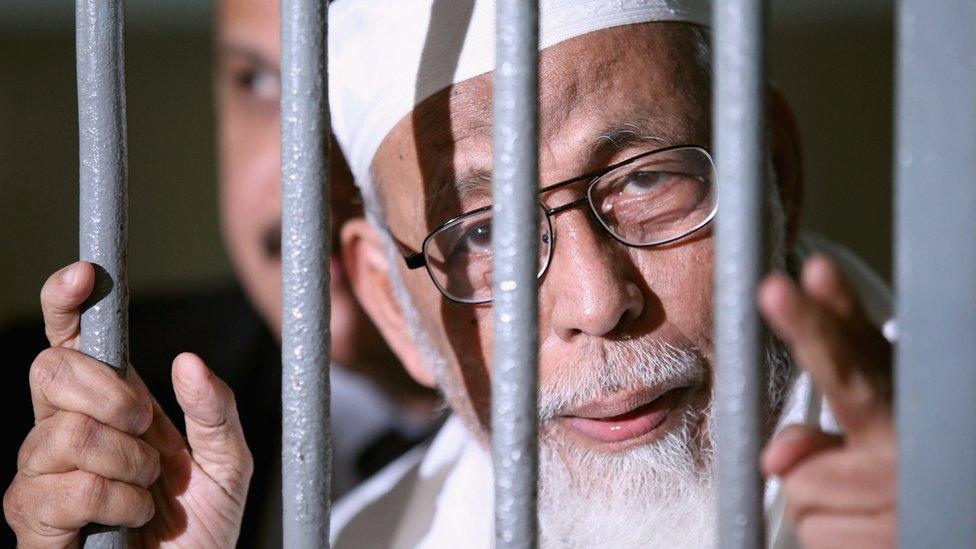
- Published11 October 2012
